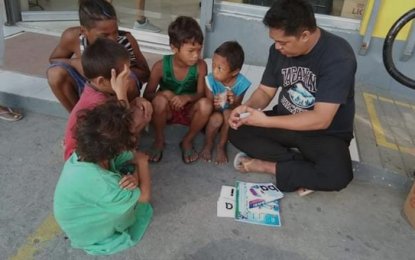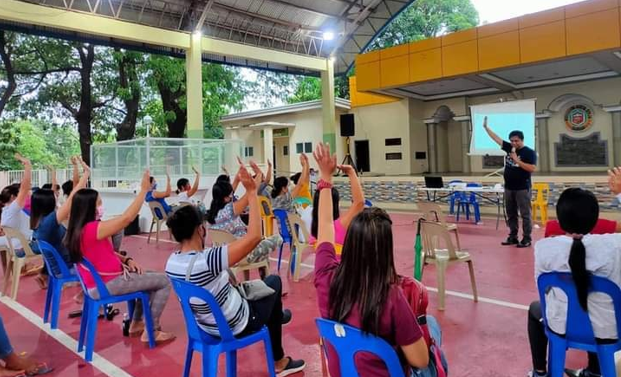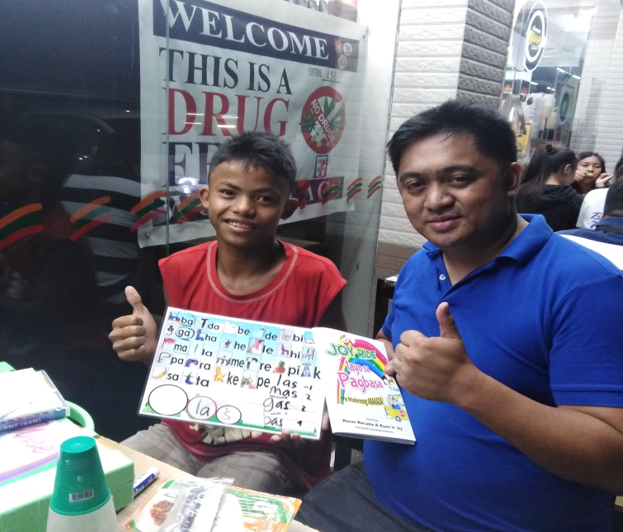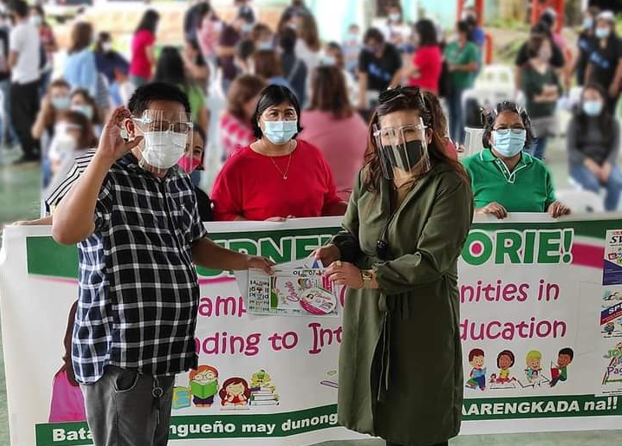
ILLITERACY TERMINATOR. Ryan V. Uy teaches street children basic reading in Barangay San Francisco, General Trias, Cavite in this undated photo. Ryan has been relentless in trying to figure out how to defeat the “rampaging bull” he called illiteracy, and eventually came up with his “Illiteracy Terminator”. (Contributed photo)
MANILA – Ryan V. Uy is a wanderer, public speaking coach, illiteracy terminator. His advocacy to put an end to illiteracy in the country is an inspiring story in these challenging times.
Ryan left his hometown in South Cotabato when he was a teenager. Back then, he was already a DJ at a local FM station and worked part-time as a professional emcee and a trainer in public speaking.
He roamed several cities in the country, taking up different jobs and confronted different challenges, but ended up in Manila in search of a better life, only to be mugged the moment he arrived.
Since then, Ryan’s life in the big city has been extremely difficult. He was jobless and lived on the streets with other people with the same plight, facing constant hunger and grappling with hopelessness.
“I witnessed with my own eyes how some of my good friends on the streets started losing their sanity,” he said.
Ryan somehow survived.
Spending what little amount he earned for food, Ryan, who was fond of reading, once saw a book sale and stumbled upon Paulo Coelho’s The Alchemist.
“I was never the same after I finished reading that book,” he said.
Encountering the Filipino literacy problem
With his resilience, Ryan, who has a bachelor’s degree in political science and English that he earned from the Notre Dame of Marbel University in Koronadal City in 2006, was able to build his life back up and continue working as a professional speaker.
Based on his life experiences, he became a speaker in seminars that covered a wide range of topics, among them personal development, program implementation efficiency, language and communication skills, and career development.
He was also behind the establishment of several public speaking and debate clubs of many schools in Cavite province. This led to the first Cavite-Wide Asian Parliamentary Debate Championships.
Eventually, Ryan was able to establish his brand of reading and communication skills development to Filipinos nationwide, through his organization called New Horizoom Academy.
While working in New Horizoom Academy, Ryan was shocked when he encountered Grades 3 and 4 students in a private school in one of the cities in Cavite who still had difficulty reading.
When he asked the teachers to bring in their “worst cases” and apply all the programs, methods, and interventions, they were all unsuccessful.
Ryan visited numerous schools and found out that the country’s education system needs a generally prescribed, comprehensive, and sustainable reading program.

The illiteracy terminator, Ryan V. Uy teaches day care teachers how to teach basic reading in Bongabon, Nueva Ecija on Oct. 15, 2020. (Contributed photo)
While teachers are passionate about what they do, they suffer from their excessive workload and need more support. And without the right tools, Ryan said teachers would not get their desired results, no matter how hard they tried.
“Hiring consultants who have diplomas from schools in America won’t help solve the reading problem in the Philippines. Learning institutions, including the Department of Education, must hire curriculum developers who have worked widely and closely with real students who are considered as worst cases. Proposed solutions must be (a) reflection of the real situations on the ground,” he said.
When it comes to solving problems and making real change happen, Ryan said one must first identify the problems and come up with solutions, through trial and error.
“So, I decided to take the bull by the horns. We tossed the usual reading books aside and decided to build our reading program from scratch,” he said.
The illiteracy terminator
And so, Ryan set out to work on his program.
Instead of helping out the usual “average students”, he went out of his comfort zone to focus on struggling students and worked with them for hours.
“I decided to create one that can deal with worst cases of non-readers. I figured that if the program we were creating back then could help learners who were classified as ‘worst cases’, teaching the rest of the learners will be a much easier feat. As it turned out, we were 100-percent correct,” he said.
Ryan was able to see one of the major problems behind the failure of the old and existing programs.
Many of the current reading strategies, he noted, do not effectively pave the way for language development, including the use of the Dolch word list.
It is good that the Dolch list uses sight words, but because it was based on American teaching styles and language phonetics, it does not come naturally to Filipino kids. Most of these words and sounds have no practical connection to a Filipino child’s understanding of their world, so it becomes mere memorization of words and sounds.
Because of this teaching style, even when the students are able to read and write, they would still struggle in comprehension and expression.
Without real understanding of the words and syllables, there is no retention, and it is thus not sustainable.

A reading session with a 16-year-old differently-abled second-grader at 7-11 in Barangay Sungay East, Tagaytay City. (Contributed photo)
Based on these insights and observations, Ryan developed his reading program.
Initially, it was a success but as he encountered more students with different problems and needs, he also tweaked his program based on his experiences with them.
Luckily, Ryan was also able to receive significant help from one of the Department of Education (DepEd) coordinators, who knew the situation on the ground.
She shared her observations and recommended a unique approach to solving the monstrous illiteracy problem.
With her help, Ryan refined his program, aka the “Illiteracy Terminator”, as he incorporated all her suggestions.
“The thing that came out after we stirred all our insights together was nothing short of magic. We knew back then that we’ve discovered something of great significance. It wasn’t a walk in the park. We had to go beyond the extra mile. We had to burn the midnight oil. But, as they say, the harder the battle, the sweeter the victory,” he said.
Eventually, it got to the point where the success rate of the program during trials was already exceeding expectations.
The Illiteracy Terminator is ready and it is about to terminate the invisible epidemic that is illiteracy.
While other programs produce results that would take several months, or in some cases, even years, Ryan’s Illiteracy Terminator unbelievably produced significant results in just a few days!
The main difference between the Illiteracy Terminator and other programs is that it helps Filipino students crack the literacy code within days. In a few weeks, they become independent readers.
It is a full-circle literacy program that deals with the practical difficulties in reading, and it numerically and objectively quantifies each student’s progress.
This way, both teacher and student could easily keep track of their obstacles and successes, having more control and insight in their learning experience.
Light of literacy
Ryan never stopped modifying and fortifying his program.
Instead of sitting in an air-conditioned room and strategizing how to improve his program, he spent countless hours working with countless students considered as the “worst cases” or the “hopeless” ones.
“In spite of the extraordinary results we’ve had, we look at the program still as a work in progress. For us, our program is a masterpiece in the making – not just another job requirement with a deadline,” he said.
Using this ingenious program, Ryan and his team started in public schools in the cities of Cavite.
One of their most memorable experiences happened in Alfonso, Cavite in September 2019.
One of the school district supervisors in the province asked all school heads in their municipality to bring their non-readers to the district office.
When they got there, Ryan and his team taught the teachers how to operate the Illiteracy Terminator. This was to ensure that they apply the process correctly.
However, before the session, Ryan asked details about the students the teachers decided to bring in. They had one thing in common – for various reasons, they were all regarded as irremediable and the worst.
“As if it just happened yesterday, I could still remember a kid who was too scared that she was shaking pitifully. While waiting for the impending results, the apprehensions were so strong that we could almost touch them,” he said.
Despite the uncertainty and tension, the anxious little girl and the other students quietly went through the entire process, as the teachers patiently applied Ryan’s prescribed steps.
Suddenly, the onlookers went into joyous applause when the anxious little girl began to read her first set of words.

Her teacher teared up in joy as she embraced her. She went up to Ryan in gratitude and said, “Sir, I thought she was hopeless.”
“The spark in their eyes and the smiles on their fragile faces never fail to make my eyes well with tears. At first, on our part, it was really a nerve-racking experience. But the experience of seeing those kids step into the light of literacy for the first time is just surreal,” he recalled.
Ryan said this was just one of the countless beautiful stories of children experiencing the light of literacy for the first time.
From the dark to the world out there and beyond
With this discovery, Ryan was able to help countless children see the light of literacy and communication.
“Illiteracy is a dream killer. It dooms people into a life of poverty and crime. Education, employment, and business opportunities around the globe are language-intensive,” he said.
Today, he said, the English language is the formal and professional language used in most institutions in the country and worldwide.
But many Filipinos struggle to read, write, comprehend, and express themselves using this language.
With Ryan’s reading program, which highlights the practical language value of words, students and young learners will start developing their proficiency in English early.
He explained how the decoding process in reading is the most important step for a child to develop good comprehension and expression skills later on.
“Now, if we want learners to develop better comprehension, they have to get out of the decoding stage as soon as possible – the earlier, the better. Efficiency in comprehension can be compared to efficiency in boxing. The earlier you get into something, the better you become at it,” he said.
As many students from private schools also struggle in these areas when entering college, Ryan has set the groundwork for the illiteracy termination in the country, hoping that many would rally his cause as a true service to Filipinos.
“Illiteracy doesn't stand even the slightest chance against our program. With God's help, we can get rid of this invisible epidemic within a few years,” he said.
Ryan said his group is now in talks with several local government and education officials who similarly value early childhood reading as an important part of educating students, particularly young learners.
“If we want our country’s future to be bright, we have to start leveling the playing field. We have to start early and give everybody equal opportunities to succeed in life. Acquiring literacy is the first best step towards a better Philippines,” he said. (PNA)
(NOTE: The writer, Louis P. Morente, is a psychology graduate and former vice president and president of the student council of Kalayaan College in Quezon City. He has worked with the Philippine News Agency for several months as a correspondent before entering college.)
